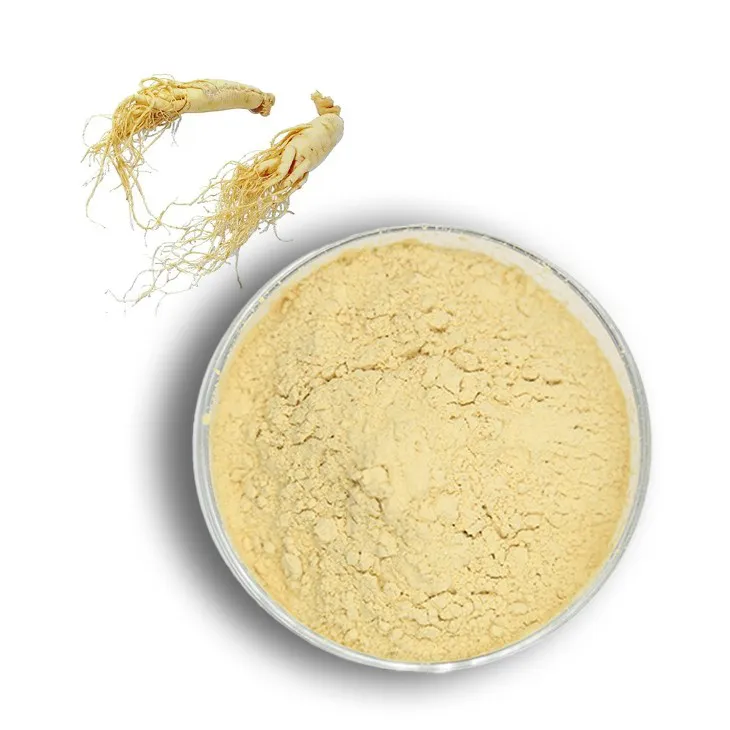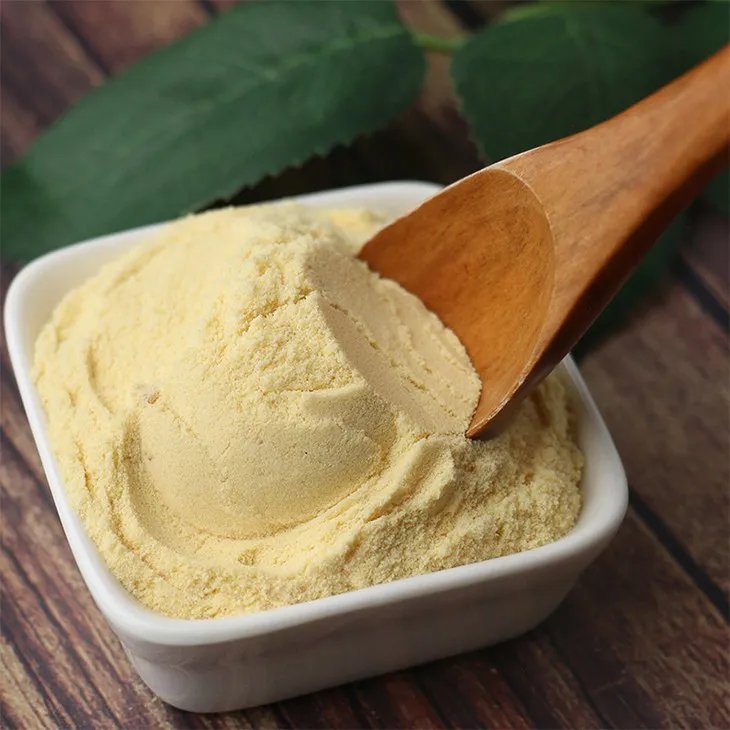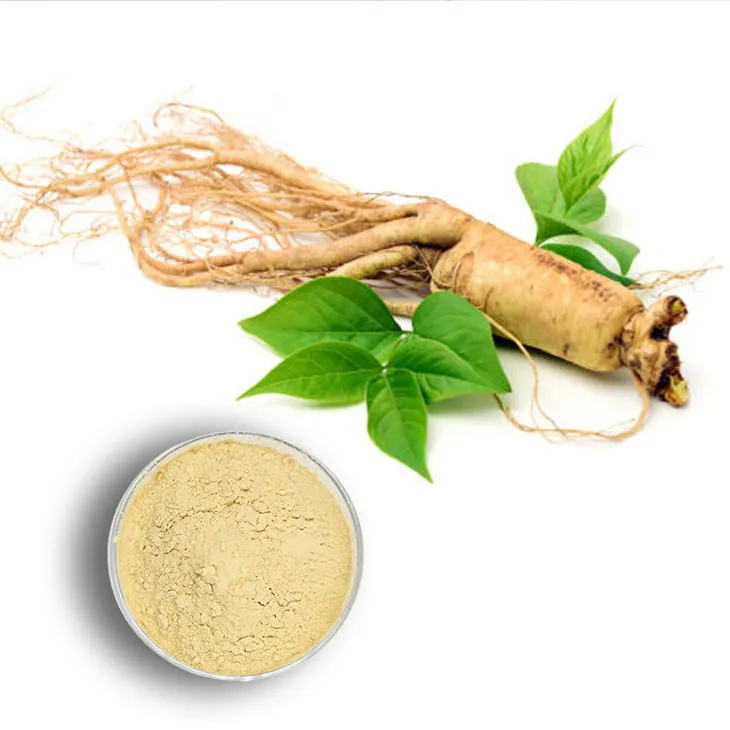- 0086-571-85302990
- sales@greenskybio.com
Ginseng root extract: a botanical drug for treating anxiety, insomnia, etc.
2024-11-13

1. Introduction
Anxiety and insomnia are common health problems that affect a significant portion of the population. In recent years, there has been a growing interest in alternative and natural remedies for these conditions. Panax Ginseng Root Extract has emerged as a potential candidate in the field of phytomedicine. This article aims to explore the various aspects of Ginseng Root Extract in relation to the treatment of anxiety and insomnia.

2. Historical Use of Ginseng in Traditional Medicine
Ginseng has a long and rich history in traditional medicine. It has been used for thousands of years in Asian countries such as China, Korea, and Japan.
2.1. In Chinese Medicine
In traditional Chinese medicine (TCM), ginseng is considered a "superior herb" with tonifying properties. It was used to boost qi (vital energy), strengthen the spleen and stomach, and enhance mental and physical functions. It was often prescribed for those with weakness, fatigue, and poor concentration, which are symptoms that can be related to modern - day concepts of anxiety and insomnia.
2.2. In Korean and Japanese Medicine
Similarly, in Korean and Japanese traditional medicine, ginseng has been highly valued. It was used to improve overall health, increase resistance to disease, and promote longevity. The historical use of ginseng in these traditional medicine systems provides a basis for further exploration of its potential in treating anxiety and insomnia.

3. Components of Ginseng Root Extract
Ginseng root contains a variety of bioactive components that may contribute to its effects on anxiety and insomnia.
3.1. Ginsenosides
Ginsenosides are the most important and well - studied components in ginseng. They are a group of saponin compounds. Different types of ginsenosides, such as Rg1, Rb1, and Re, have been shown to have various pharmacological effects. For example, some ginsenosides may act on the central nervous system (CNS) by modulating neurotransmitter levels. They can affect the release and reuptake of neurotransmitters like serotonin, dopamine, and gamma - aminobutyric acid (GABA), which are closely related to mood regulation and sleep - wake cycles.
3.2. Polysaccharides
Ginseng polysaccharides also play a role in its medicinal properties. These complex carbohydrates have immunomodulatory effects and may also have an impact on the nervous system. They can potentially enhance the body's resistance to stress, which is relevant in the context of anxiety and insomnia. Stress is a major factor contributing to these conditions, and by improving the body's stress response, ginseng polysaccharides may help in alleviating symptoms.
3.3. Other Components
In addition to ginsenosides and polysaccharides, ginseng root extract contains other components such as flavonoids, volatile oils, and amino acids. While the exact mechanisms of these components in relation to anxiety and insomnia are not fully understood, they may work in synergy with the major components to produce the overall beneficial effects.

4. Potential Mechanisms in Alleviating Anxiety and Insomnia
The effects of ginseng root extract on anxiety and insomnia may be mediated through multiple mechanisms.
4.1. Neurotransmitter Modulation
As mentioned earlier, ginsenosides can influence neurotransmitter levels. Serotonin is known as the "happiness hormone" and is involved in mood regulation. By promoting the release or inhibiting the reuptake of serotonin, ginseng root extract may improve mood and reduce anxiety. GABA is an inhibitory neurotransmitter that plays a crucial role in promoting relaxation and sleep. Some components of ginseng may enhance GABAergic activity, thereby helping with insomnia.
4.2. Anti - stress and Adaptogenic Effects
Ginseng is often referred to as an adaptogen, which means it can help the body adapt to stress. Chronic stress is a significant contributor to anxiety and insomnia. Ginseng root extract may act on the hypothalamic - pituitary - adrenal (HPA) axis, which is the body's main stress - response system. By regulating the HPA axis, it can reduce the over - production of stress hormones such as cortisol, leading to a more balanced physiological state and potentially alleviating anxiety and insomnia symptoms.
4.3. Anti - inflammatory Effects
There is increasing evidence that inflammation in the body can be associated with anxiety and insomnia. Ginseng root extract has been shown to possess anti - inflammatory properties. It can reduce the production of pro - inflammatory cytokines in the body. By reducing inflammation, it may have a positive impact on the nervous system and help in the treatment of these conditions.

5. Modern Research Validating Efficacy
In recent years, numerous scientific studies have been conducted to evaluate the efficacy of ginseng root extract in treating anxiety and insomnia.
5.1. Animal Studies
Animal studies have provided valuable insights. For example, in mouse models of anxiety, treatment with ginseng root extract has been shown to reduce anxiety - like behaviors. Mice treated with ginseng showed less time in the open - arm of the elevated plus - maze, which is an indicator of reduced anxiety. In sleep studies, ginseng root extract has been found to increase the total sleep time and improve sleep quality in rats.
5.2. Human Studies
Several human clinical trials have also been carried out. In some studies on patients with anxiety disorders, ginseng supplementation was associated with a reduction in anxiety symptoms. Subjects reported feeling less worried, more relaxed, and having improved mental well - being. In insomnia studies, ginseng root extract has shown promising results in improving sleep onset latency, increasing sleep duration, and enhancing overall sleep quality. However, it should be noted that more large - scale, high - quality human studies are still needed to further confirm these findings.

6. Safety Aspects and Possible Side - Effects
When considering ginseng root extract as a treatment option, it is important to evaluate its safety.
6.1. General Safety
Overall, ginseng root extract is considered relatively safe when used appropriately. It has been used in traditional medicine for a long time without significant adverse effects in most cases. However, like any herbal supplement, it may not be suitable for everyone.
6.2. Side - Effects
Some possible side - effects have been reported. These include mild gastrointestinal discomfort such as nausea, diarrhea, and stomach upset. In rare cases, allergic reactions may occur. High - dose or long - term use may also lead to more serious side - effects, such as hypertension or hormonal imbalances. It is important to follow the recommended dosage and consult a healthcare provider before starting ginseng supplementation, especially for those with pre - existing medical conditions.
7. Different Forms of Administration for Optimal Results
Ginseng root extract can be administered in different forms, and the choice of form may affect its efficacy.
7.1. Oral Administration
Oral administration is the most common form. Ginseng root extract can be taken in the form of capsules, tablets, or tinctures. When taken orally, it is absorbed through the gastrointestinal tract and then enters the bloodstream to exert its effects. However, the bioavailability may vary depending on the formulation. For example, some encapsulated forms may be designed to enhance absorption.
7.2. Topical Application
Topical application of ginseng - based products is also possible. Some creams or ointments containing ginseng extract are used for skin - related issues, although the evidence for its direct effect on anxiety and insomnia through topical application is limited. However, it may have some local effects on the skin's nervous system receptors, which could potentially have an indirect impact on overall well - being.
7.3. Inhalation
Inhalation of ginseng - containing vapors or essential oils is another form of administration. While this method is not as commonly studied for anxiety and insomnia, it may have potential benefits. Inhalation can allow for rapid absorption through the lungs, and the aromatic compounds in ginseng may have a direct impact on the nervous system. However, more research is needed to fully understand the effectiveness of this form of administration.
8. Conclusion
Panax ginseng root extract shows great potential as a phytomedicine for the treatment of anxiety and insomnia. Its long history of use in traditional medicine, along with the emerging evidence from modern research, supports its efficacy. The various components in ginseng root extract work through multiple mechanisms to potentially alleviate anxiety and insomnia symptoms. However, safety considerations and possible side - effects should not be overlooked. Further research, especially large - scale human clinical trials, is needed to fully understand its therapeutic potential and optimize the forms of administration for the best results. Overall, ginseng root extract represents an exciting area of research in the search for natural remedies for anxiety and insomnia.
FAQ:
1. What are the main components in ginseng root extract that may treat anxiety and insomnia?
Ginseng root extract contains various components such as ginsenosides. Ginsenosides are believed to have potential effects on the nervous system. They may interact with neurotransmitters in the brain, for example, modulating the levels of serotonin and dopamine which are related to mood regulation. This interaction could potentially contribute to the alleviation of anxiety and improvement of sleep quality in cases of insomnia.
2. How has ginseng been used historically in traditional medicine for anxiety and insomnia?
In traditional medicine, ginseng has been used for centuries to enhance overall well - being, including for the treatment of anxiety - like symptoms and sleep disorders. It was often prepared as a decoction or tincture. Traditional healers believed that ginseng could balance the body's energy, or Qi", which was thought to be disrupted in conditions like anxiety and insomnia. For example, in Asian traditional medicine systems, it was prescribed to people with excessive stress or those experiencing restlessness at night.
3. What does modern research say about the efficacy of ginseng root extract in treating anxiety and insomnia?
Modern research has conducted numerous studies on ginseng root extract. Some pre - clinical studies using animal models have shown that ginseng can reduce anxiety - related behaviors. In human studies, while results are somewhat mixed, there are indications that it may help improve sleep quality in people with insomnia. For example, certain studies have measured the impact on sleep architecture, such as increasing the amount of deep sleep. However, more large - scale, high - quality clinical trials are still needed to firmly establish its efficacy.
4. Are there any side - effects associated with using ginseng root extract for anxiety and insomnia?
Yes, there can be side - effects. Some people may experience digestive issues such as nausea, diarrhea or abdominal discomfort when taking ginseng root extract. In addition, it may cause changes in blood pressure in some individuals. There are also concerns about potential interactions with other medications. For example, it may interact with anticoagulants or medications for diabetes, so it is important to consult a healthcare provider before using ginseng root extract, especially if one is taking other medications.
5. What are the different forms of administration of ginseng root extract for the best results in treating anxiety and insomnia?
Ginseng root extract can be administered in various forms. It is available as capsules or tablets, which are convenient for regular use. It can also be consumed as a tea, which is a more traditional form. Another form is tinctures. The choice of form may depend on personal preference and how the body absorbs and responds to the extract. For example, some people may find that the slow - release nature of capsules provides a more sustained effect, while others may prefer the immediate effect of a tincture. However, the optimal form may also vary depending on the severity of the anxiety or insomnia and individual physiological characteristics.
Related literature
- "The Pharmacological Effects of Ginseng on the Nervous System"
- "Ginseng and Its Role in Traditional and Modern Medicine for Sleep Disorders"
- "A Review of Ginseng Root Extract: Efficacy, Safety, and Mechanisms in Anxiety Treatment"
- ▶ Hesperidin
- ▶ Citrus Bioflavonoids
- ▶ Plant Extract
- ▶ lycopene
- ▶ Diosmin
- ▶ Grape seed extract
- ▶ Sea buckthorn Juice Powder
- ▶ Fruit Juice Powder
- ▶ Hops Extract
- ▶ Artichoke Extract
- ▶ Mushroom extract
- ▶ Astaxanthin
- ▶ Green Tea Extract
- ▶ Curcumin
- ▶ Horse Chestnut Extract
- ▶ Other Product
- ▶ Boswellia Serrata Extract
- ▶ Resveratrol
- ▶ Marigold Extract
- ▶ Grape Leaf Extract
- ▶ New Product
- ▶ Aminolevulinic acid
- ▶ Cranberry Extract
- ▶ Red Yeast Rice
- ▶ Red Wine Extract
-
Lemon Extract
2024-11-13
-
Centella Asiatica Extract
2024-11-13
-
Rosemary extract
2024-11-13
-
Kupilu Extract
2024-11-13
-
White Peony Extract
2024-11-13
-
Almond Extract Powder
2024-11-13
-
Feverfew Extract
2024-11-13
-
Black Garlic Extract
2024-11-13
-
Epimedium extract powder
2024-11-13
-
Black Pepper Extract
2024-11-13





















